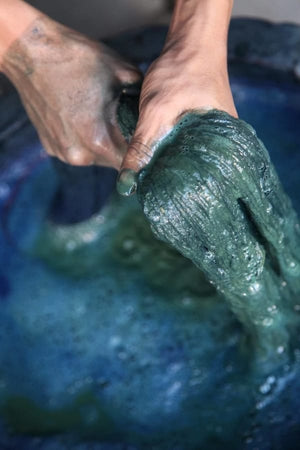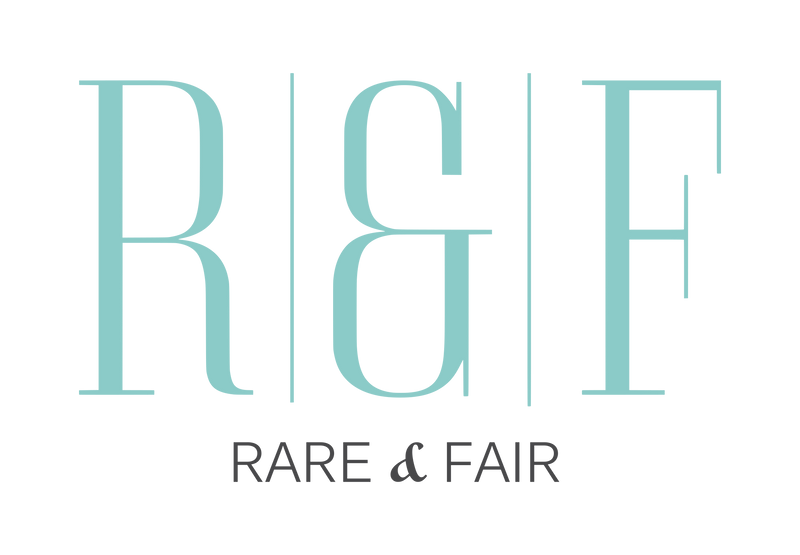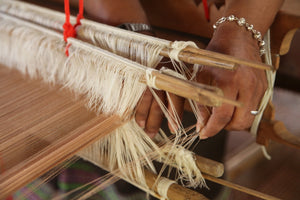In this post we will help you to better understand what ethical clothing is, why it is important, and empower you with the knowledge you need to make informed decisions about your fashion choices.
What is Ethical Clothing?
‘Ethical Clothing’, or ‘Ethical Fashion’ as it is commonly referred to, is an all-encompassing term which applies to how issues are addressed and standards adhered to when designing and manufacturing clothing: by maintaining ethical standards, a company is prioritising the welfare of its workers while minimising its effects on the environment.
In an article exploring the importance of ethical clothing shops, Ethical Consumer Magazine offers the following definition:
‘Ethical fashion (sometimes known as slow fashion or sustainable fashion) is a way of producing and buying (or not buying) clothing that takes into account environmental and other social concerns. These concerns can range from the fair treatment of workers to the use of organic cotton.’
What does it mean to be an ethical clothing brand?
For a brand to be ethical it means that certain principles are set out and adhered to throughout the manufacturing process, such as safe working conditions, a good living wage, and standard working hours. In addition, a key aspect of an ethical clothing brand is its ability to manufacture products while minimising the impact on the environment.
It can be confusing when searching for ethical brands as there are many terms that incorporate similar values, such as 'Fair Trade', 'sustainable', and 'slow fashion', but it is important to remember that regardless of how sustainable or environmentally responsible a company is, ethical brands prioritise these values in addition to ensuring that workers are kept safe and paid a good living wage.
Ethical brands will nurture relationships with suppliers, and in many cases, support traditional production methods and community development.
How do you find an ethical clothing company?
How do you know if a company is genuinely ethical or just appears so? It can be hard to determine if a brand is ethical, especially when similar terms are being used, like ‘sustainable’ or ‘organic clothing'. It can be confusing to know which brands abide by ethical standards.
Here are five key questions you can ask yourself, or the company, to ensure you are supporting a brand with ethical values:
- Is there transparency throughout the supply chain?
- Do they share information on where they source their materials?
- Does the company have ethical values at its core and on its mission statement, or do they just offer a small range of ethical/sustainable fashion to try to ‘offset’ their more damaging production methods?
- See how they interact with their online community - do they have support from key players in the ethical clothing industry?
- Is the company a small boutique brand?
- Generally speaking, ethical clothing brands tend to operate on a smaller scale, and as such, this results in a quality over quantity approach, with smaller ranges but high-quality collections
- Smaller ranges and fewer ‘micro-seasons’ equates to smaller more transparent supply chains, and limits dangerous outsourcing of production lines
- Many small boutique brands will have more personal relations with their suppliers. For example, at RARE & FAIR we meet our suppliers and artisans personally to understand their needs and to make sure all workers are being treated well and paid a fair living wage
As more companies are being challenged on their manufacturing processes, consumers are gaining confidence in the brands that are being transparent. Ethical fashion is becoming more widespread, and as a result, it is becoming easier to identify which companies to trust and which to avoid. However, there is still a tendency for big brands to ‘greenwash’ customers with a small range of ‘sustainable’ or ‘organic’ clothing, with little information available on production methods or sustainability for larger collections.
Big brands need to take ownership of the areas of neglect in their supply chains, commit to making positive changes, and follow through with those commitments. Until then, it will be important for customers to fully equip themselves with the right knowledge to know which questions to ask when challenging their favourite high-street brands, and ‘vote with their feet’ if a company does not live up to their own individual ethical and moral requirements.
What should you avoid when looking for an ethical company?
Two words: Quick, Cheap.
Mass producing cheap clothing is a huge red flag. It is unlikely that ethical standards are in place throughout the manufacturing process, and combined with a lack of transparency, it can be difficult to locate company policies. Some brands may even be unaware of what is happening at factory-level, as we have seen recently in the news with brands coming under fire for workers being paid less than the minimum wage.
Fast Fashion
In recent decades we have seen the emergence of fast fashion - a concept whereby consumers are encouraged to purchase must-have items, subsequently only to be worn a handful of times before throwing it away. Where it used to take months for clothes to go from design to shop floor, fast fashion brands have 'optimised' modern production methods to manufacture inexpensive items within just a few weeks.
Mass producing garments with such a low price tag creates a wide-spread knock-on effect throughout the supply chain, as pressure mounts on suppliers to lower their prices to remain competitive, which in turn stretches their own resources.
The bottom line - if you think something is a bargain, the likelihood is that the brand is cutting corners, be that wages, or health and safety measures. As Lucy Siegle astutely concludes in the documentary The True Cost:
‘Fast fashion is not free. Someone somewhere is paying’.
To add fuel to the fire, gone are the days of just two fashion seasons on the high-street (spring/summer and fall/winter) - with shorter fashion cycles we are now seeing up to 100 micro-seasons per year, which equates to almost two new collections per week!
With fast fashion playing perfectly into the ‘wear it once’ culture, ethical clothing aims to counteract this by producing good quality clothes that are made to last. Encouraging a ‘closing the loop’ approach to the production of clothing, ethical brands are changing the way we dress ourselves from the ground up.
Greenwashing
Some brands will use terms like ‘green’ or ‘eco-friendly’ in their marketing, but this can be deceptive and enables a brand or company to appear more ethical or environmentally friendly, without the details to back it up.
A well-known example of this is H&M’s Conscious Collection: this particular line of clothing is said to be created using sustainable materials and methods, however, H&M has come under fire for potentially misleading their customers. In 2019, the deputy director of Norway’s Forbrukertilsynet, or Consumer Authority, concluded:
‘Since H&M are not giving the consumer precise information about why these clothes are labelled Conscious, we conclude that consumers are being given the impression that these products are more “sustainable” than they actually are.’
Popular brands that have included environmentally-focused messages in their marketing have noticed an uptake in sales, so it is a direction that appeals to many in the fashion industry.
According to NYU Stern’s Centre for Sustainable Business:
‘Products marketed as sustainable grew 5.6 times faster, indicating a shift in consumer preference towards environment-friendly products.’
If companies can market a specific line as sustainable, this makes their business appear more ‘green’ overall. As a consumer it’s important to realise that just because something is labelled ‘eco-conscious’ or ‘green’, it doesn’t necessarily mean the company is wholly ethical or sustainable.

Can affordable fashion really be ethical?
This begs the question, is it possible to mass-produce clothes that are affordable and ethical? Well, it could be, but it will require both top-down and bottom-up controls, as well as a change in mentality amongst consumers where ‘affordable’ doesn’t necessarily mean the 'cheapest at any cost'.
As brought to light in the documentary The True Cost, brands will often recoup the cost of selling items at a lower price point by paying garment factories less for their work. This has an unhealthy knock-on effect as garment factories are forced to accept work at a reduced rate, as to refuse business would only put them at risk of not receiving work in the future, resulting in decreased wages, longer working hours, and limited budgets to maintain safe working environments.
To sustain a healthy supply chain, fashion brands need to stop selling items at unrealistic prices, and offer more information upfront on where they are sourcing their materials from, in addition to where items are being made. With more information available consumers can decide for themselves if a particular brand or item of clothing is sold at a fair and affordable price, taking into account how it has been produced and whether it aligns with their own ethical standards.
Governments also have a role to play, through stricter regulations and environmental targets for fashion retailers, as well as rewarding ethical companies through tax relief, grants and subsidy programmes, rewards that could then be passed on to customers through the price tag.
The challenge with creating ethical fashion at a lower price point
One of the biggest challenges facing ethical companies is being able to engage with consumers looking for a lower price point. With budgets being correctly allocated between sturdy supply chain processes and high quality environmentally friendly materials, the cost is reflected in the end product. Ethical clothing brands are selling higher quality items, and even a way of life, but without the ability to offer ‘fast fashion’ prices.
In an ideal world, all clothing would tick every ethical box, but unfortunately, sometimes trade-offs are necessary, especially if you are looking to shop on a budget. Understanding your own ethical standpoint will help when selecting your ethical brands. Think about how much you care for the environment, workers' rights, and animal rights, as understanding your own moral compass will help when making these tough decisions. Most importantly ask questions, and if you’re not sure, vote with your feet!
Buying ethical clothing - why does it matter?
Basic. Human. Rights.
We believe that everyone should be entitled to basic human rights, and we’re pretty sure that if you are reading this, you do too.
Buying a blouse shouldn’t require the life of a garment worker. Materials that are made to protect our skin don’t need to contain harsh chemicals. We believe that the fashion industry holds the power to drive positive change; empower skilled workers and communities, and enable traditions and rich histories to thrive.
By making a purchase from an ethical company you are supporting and empowering real people, and making a conscious decision to reduce your impact on the environment.
It can seem overwhelming once you have realised the full power your purchasing decisions have, however, like with any ethical or sustainable journey, it starts with small steps.
Quality over quantity
It may appear to cost a little more in the short term, but by purchasing fewer, ethically created items you will be extending the life of your wardrobe, and with the right care, your clothes will last longer.
One could also go as far as to say that actually, ethically produced clothing costs the correct amount - this is how much clothes should cost when garment workers are paid an adequate living wage, can operate within safe working conditions, and where factories are not put in a position where they have to accept work whatever the cost.
That being said, when we talk about quality it is also important to be aware that some of the major luxury fashion brands still obtain fabrics with little information on where they have been sourced, especially when it comes to leather and fur. Unfortunately, it is a common misconception to believe that just because something has a higher price point, that the brand maintains ethical practices throughout the production process.
In Behind the Mirror of high-end fashion, DW documentary investigates how high-end leather is produced, highlighting some of the issues we are facing with designer fashion brands today.
As it stands, large designer brands have the most power to support ethical practices, however, many of them are not aware of the issues that lie within their very own supply chains.
It is important to be aware that just because a brand is designer, it doesn’t mean it is ethical. It isn’t just fast fashion that is causing a problem, issues with ethical standards can be found throughout the fashion industry, from the high-end to the low-end.
Ethical clothing supports people and the planet
Ethical clothing brands take sustainability a step further, by not only minimising the effect on the environment, but also by supporting workers with good living wages and providing safe working conditions. By empowering their workers they are also supporting the local community and in turn, the economy. In some smaller communities, this can also mean preserving local artisans’ cultures and traditions.
Most importantly, ethical clothing brands focus on what is morally right for people and the planet.
How RARE & FAIR embodies the true meaning of Ethical Clothing
What happens when you purchase clothing from RARE & FAIR?
Here at RARE & FAIR we have taken the time to build long-lasting relationships with our suppliers, and as a result, we can trace every single item back to its origin. Learn more about our practices in 'our promise'.
With every purchase from RARE & FAIR you are keeping artisans’ culture and traditions alive, and supporting women and communities in rural Thailand.
Here are just a few examples of how RARE & FAIR supports its workers and communities:
- Hand-weaving in Rural Thailand - a traditional art improving the quality of life for the locals
- Tohsang Cotton Village - supporting the local land with sustainable production of cotton in line with the Earth’s natural cycle
- Fashion Service Studio - displaying local sensitivity and social responsibility, with fair wages and safe working conditions
Shopping ethically doesn’t mean you have to sacrifice style - here at RARE & FAIR you will find something for every occasion.
Learn more about our natural fibre clothing and how we support the communities that design and create our collections by signing up for our newsletter below, or by shopping our collections.




